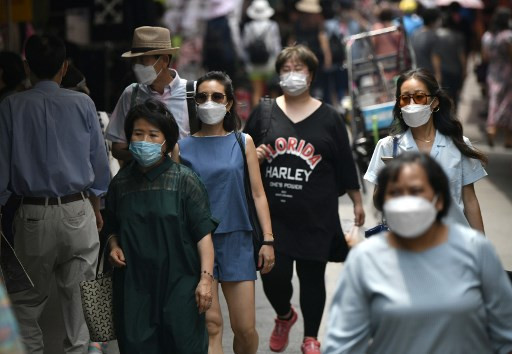Popular Reads
Top Results
Can't find what you're looking for?
View all search resultsPopular Reads
Top Results
Can't find what you're looking for?
View all search resultsCoronavirus spreading now in Korea has its origin in Europe, US
Change text size
Gift Premium Articles
to Anyone
The novel coronavirus spreading in South Korea now has its origin in Europe and the US, health authorities said Monday.
The variant belongs to the GH clade, which is usually found in Europe and the US, according to an analysis on genome samples. This implies the virus could have been imported into Korea by those who entered Korea from those regions in March and April.
“As we interpret it, the virus belonging to the GH clade is circulating recently because we had many arrivals from Europe and the US in March and April, and the virus imported then is now driving community transmissions,” said Korea Centers for Disease Control and Prevention Director Jeong Eun-kyung, at a briefing.
The variants found in the genome samples in February and March, when the country saw hundreds of cases linked to a church in Daegu and hospital in North Gyeongsang Province at the peak of the COVID-19 outbreak here, belonged to the S clade and V clade. The virus in the S and V clades were circulated largely in China, where the coronavirus is believed to have originated from, and other parts of Asia.
Touching on recent study results on the possibility of airborne spread of the COVID-19, Jeong said that the measures to prevent the spread of the virus stays the same, calling on the public to stick to the basic rules such as avoiding enclosed, populated environments, wearing masks and washing hands.
This came after 239 scientists from 32 countries called on governments to acknowledge the aerosol transmission of the COVID-19 and take control measures in an open letter to be published this week.
On Monday, Korea reported 48 more COVID-19 cases as the country continues to see small-scale outbreaks, infections coming from overseas as well as an increasing number of cases with unidentified routes of transmission.
Half of the new cases, 24, were locally transmitted and the other half were imported. Of the locally transmitted cases, seven were registered in Gwangju in connection with a previously identified Buddhist temple cluster. Five cases were reported in Gyeonggi Province, five in Incheon, two each in South Jeolla Province, Daejeon and Seoul, according to the KCDC.
Seven more people tested positive for the coronavirus in connection with the temple in Gwangju, bringing the number of related total infections to 87, according to the KCDC.
A surge in cases in South Jeolla Province, which surrounds Gwangju, led the provincial government to tighten social distancing measures. Under the “social distancing level 2,” gatherings of 50 or more people indoors or 100 or more people outdoors are banned, and wearing masks is mandatory when using public transportation.
Of the total cases reported in the past week, infection routes for 10.7 percent of the cases remain unidentified, Jeong said, adding “quiet transmission” among those in their 50s or over is taking place in the community.
Korea reported 24 additional imported cases, 21 of them were from Asia and three from the Americas. Some 15 people detected at the airport quarantine screening and the rest while under quarantine after they entered the country from abroad.
Out of the country’s total 13,137 cases, 11,848 people, or about 90.2 percent, were released from quarantine after making full recoveries. Some 1,005 people are under quarantine.
One more patient died, bringing the death toll to 284. The overall fatality rate stands at 2.16 percent.
The country has carried out 1,297,367 tests since Jan. 3, with 21,292 people being tested as of Monday.










